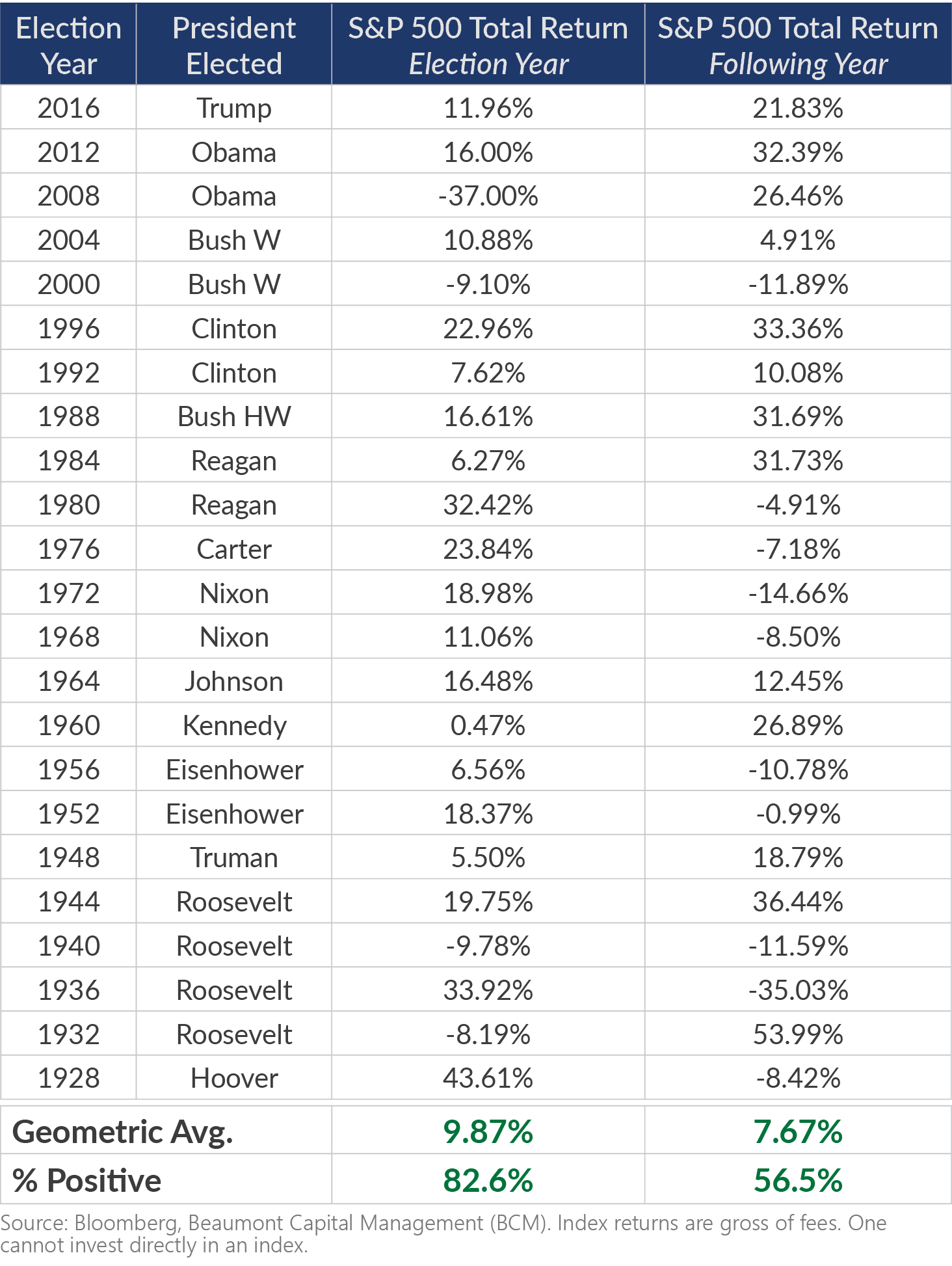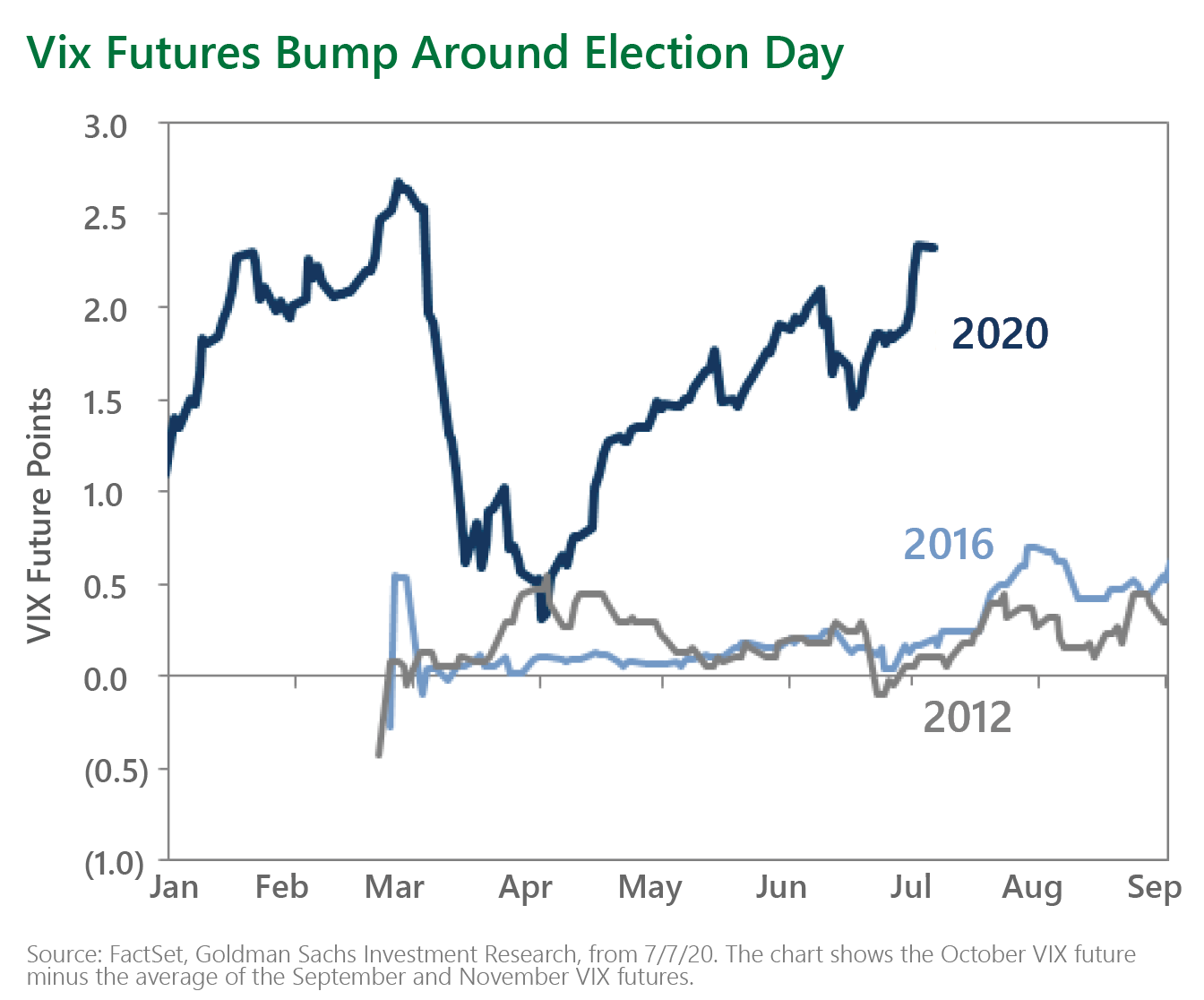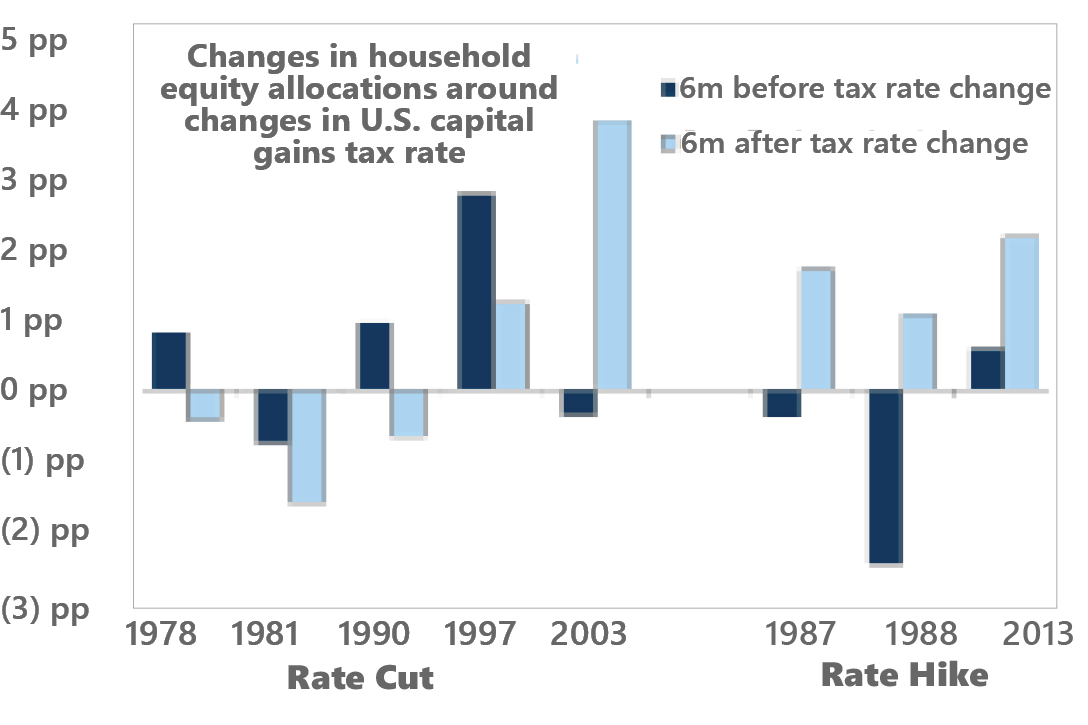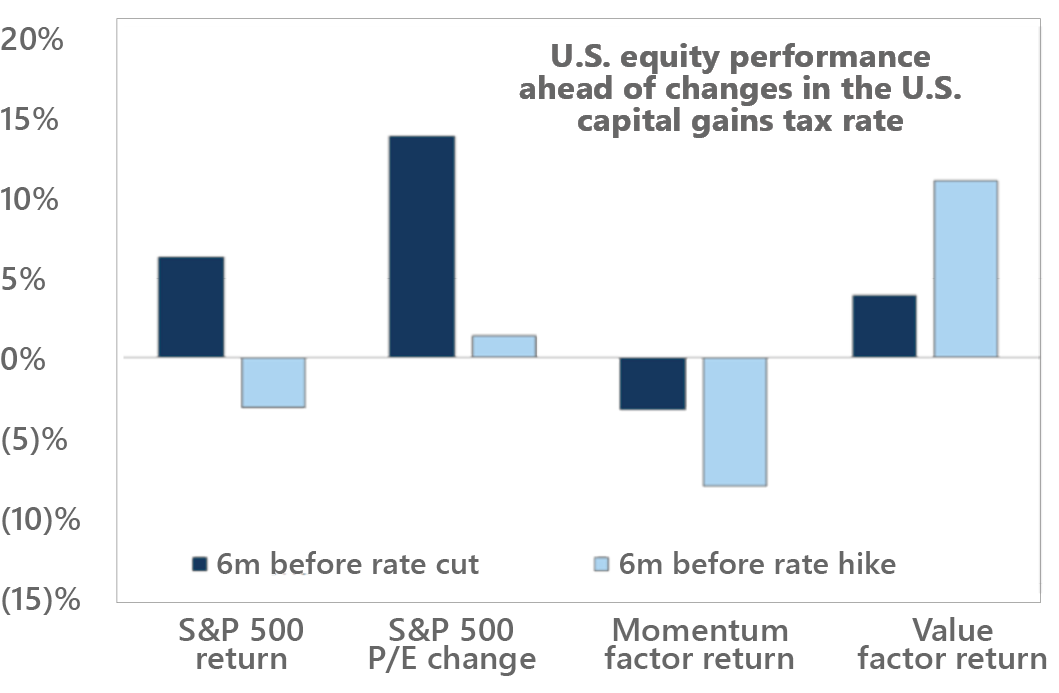
Written by Brendan Ryan
How Should Investors Think About the Upcoming Election’s Impact on the Stock Market?
August 11, 2020 | ECONOMICS & INVESTING
The top question we are being asked from advisors right now: “is there data that can help me anticipate stock market returns in an election year?” While we have outlined some key data worth examining, our takeaway is we would caution against making any significant investment decisions based on these trends.
From a historical standpoint, equity markets usually rise in an election year. Since 1928, equity markets (as represented by the S&P 500® Index) have increased in almost 83% of election years. This corresponds to an average annual return

of nearly 10%, close to the average return of the S&P 500 during that time. In the year after an election, the market has done a bit worse. However, there is likely little to draw from this as simply removing 1928 and the following year—i.e. the start of the Great Depression—from the analysis results in nearly identical performance for election years and the following year at 8.5%.
Additionally, there is some evidence that markets do a bit better towards the end of a presidential term than near the beginning. However, given that markets are forward looking and election years historically have performed similarly to a random year in the market, we wouldn’t anchor to any sort of election estimate or strategy. In fact, it is likely that the market has a bigger impact on the election than the election does on the market.
It is important to remember that none of the results to the right occurred in the vacuum. Exogenous events have always impacted markets in or around election years such as the Great Recession in 2008, 9/11 in 2001, the oil embargo in 1973, and both the Great Depression and WWII in the 1930’s and 40’s to name a few.
Similarly, 2020 is anything but “normal.” Although the coronavirus has had a far bigger impact on the market’s volatility (and perhaps the election itself), there is evidence that investors believe this election is “riskier” than a normal one. The below chart shows the difference in the implied volatility for options expiring around the election. This is a decent measure for how much additional risk investors are expecting during that particular time period. There is a noticeable increase, specific to the election, that we haven’t seen in other years. Implied volatility has increased 2-3% around this year’s election compared to a more minuscule—sub 1%—increase in the prior two elections.

Some of the obvious reasons for this are the large policy changes that could occur if Joe Biden were to be elected, as well as uncertainty surrounding voting procedures due to coronavirus. One key aspect of Biden’s proposed tax plan that could have a direct impact on equity markets is an increase in the capital gains tax. There is some historical precedent that investors will reduce their exposure to equities prior to a capital gains tax increase, which has had a short-term negative impact on market performance in the past. However, typically that impact is short lived and given how low interest rates are at the moment, it seems unlikely investors would permanently change their asset allocations even in the face of increased capital gains—but it is definitely a narrative to monitor.
Equities and Changes to Capital Gains Tax


Source: (top) FRB, Goldman Sachs Investment Research; (bottom) Goldman Sachs Investment Research, from 7/7/20
One potential off-setting positive is that both Trump and Biden appear in favor of infrastructure spending, which should boost growth in the economy and benefit a large array of equities.
We believe our strategies, which are attuned to how investors behave, should be able to navigate any type of situation even if there is not a clear historical parallel, and we view the potential volatility as an opportunistic environment for our strategies to exploit. As the market continues to incorporate different potential outcomes into its pricing, it will provide our strategies with an indirect view of what may happen, and we expect the systems to reposition accordingly.
Sources and Disclosures:
1 WSJ Daily Shot, 3/28/20
2,3 WSJ Daily Shot, from 3/30/2020
4,5,6,7 “What the Federal Reserve Can Do to Fight Recession.” Wall Street Journal, 3/26/20. https://www.wsj.com/video/what-the-federal-
reserve-can-do-to-fight-recession/D23403CC-088F-472C-848A-814BC1829E74.html
Copyright © 2020 Beaumont Capital Management LLC. All rights reserved. All materials appearing in this commentary are protected by copyright as a collective work or compilation under U.S. copyright laws and are the property of Beaumont Capital Management. You may not copy, reproduce, publish, use, create derivative works, transmit, sell or in any way exploit any content, in whole or in part, in this commentary without express permission from Beaumont Capital Management.
Past performance is no guarantee of future results. Index performance is shown on a gross basis and an investment cannot be made directly in an index. The performance of any ETFs, as contributors or detractors to the strategy, are provided on a gross basis. An Exchange Traded Fund (ETF) is a security that tracks an index, a commodity or a basket of assets like an index fund, but trades like a stock on an exchange. ETFs experience price changes throughout the day as they are bought and sold. All BCM strategies invest only in long-only ETFs.
This material is provided for informational purposes only and does not in any sense constitute a solicitation or offer for the purchase or sale of a specific security or other investment options, nor does it constitute investment advice for any person. The material may contain forward or backward-looking statements regarding intent, beliefs regarding current or past expectations. The views expressed are also subject to change based on market and other conditions. The information presented in this report is based on data obtained from third party sources. Although it is believed to be accurate, no representation or warranty is made as to its accuracy or completeness.
As with all investments, there are associated inherent risks including loss of principal. Stock markets, especially foreign markets, are volatile and can decline significantly in response to adverse issuer, political, regulatory, market, or economic developments. Sector and factor investments concentrate in a particular industry, and the investments’ performance could depend heavily on the performance of that industry and be more volatile than the performance of less concentrated investment options and the market as a whole. Securities of companies with smaller market capitalizations tend to be more volatile and less liquid than larger company stocks. Foreign markets, particularly emerging markets, can be more volatile than U.S. markets due to increased political, regulatory, social or economic
uncertainties. Fixed Income investments have exposure to credit, interest rate, market, and inflation risk.
Diversification does not ensure a profit or guarantee against a loss.
The Standard & Poor’s (S&P) 500® Index is an unmanaged index that tracks the performance of 500 widely held, large-capitalization U.S. stocks. Indices are not managed and do not incur fees or expenses. The S&P Small Cap 600® Index is an unmanaged index that tracks the performance of 600 widely held, small-capitalization U.S. stocks. The MSCI World Index is a free float-adjusted market
capitalization weighted index that is designed to measure the equity market performance of developed markets. The MSCI World ex-U.S. Index is a free float-adjusted market capitalization weighted index that is designed to measure the equity market performance of developed markets, excluding the United States. The MSCI ACWI Index captures large and mid-cap representation across 23 Developed Markets and 26 Emerging Markets countries. The MSCI ACWI Index ex-U.S. captures large and mid-cap representation across 22
Developed Markets and 26 Emerging Markets countries, excluding the United States. The Bloomberg Barclay’s U.S. Aggregate Bond Index is a broad base index and is often used to represent investment grade bonds being traded in the United States.
“S&P 500®”, and “S&P Small Cap 600®” are registered trademarks of Standard & Poor’s, Inc., a division of S&P Global, Inc. MSCI® is the trademark of MSCI Inc. and/or its subsidiaries.
The BCM investment strategies may not be appropriate for everyone. Due to the periodic rebalancing nature of our strategies, they may not be appropriate for those investors who desire regular withdrawals or frequent deposits.
For Investment Professional use with clients, not for independent distribution. Please contact your BCM Regional Consultant for more information or to address any questions that you may have.
Beaumont Capital Management was originally created in 2009 as a separate division of Beaumont Financial Partners, LLC. Beaumont Capital Management LLC spun off as its own entity as of 1/2/2020. Beaumont Financial Partners, LLC was originally registered as
Beaumont Trust Associates in 1981 and was reorganized into Beaumont Financial Partners, LLC in 1999.
Beaumont Capital Management LLC
75 2nd Ave, Suite 700, Needham, MA 02494 (844-401-7699)
Popular Posts
- 4Q24 Commentary: Priced for Perfection – S&P 500 Increasingly Dependent on the AI trade
- Factor Investing: Smart Beta Pursuing Alpha
- Artificial Intelligence Doesn’t Appear Ready to Take Over the World Yet
- Personal Spending Recovers, Comparing 2020 to Past Recessions, and a Looming Threat to DB Plans
- Tactical to Practical: Understanding the Importance of Types of Market Declines

